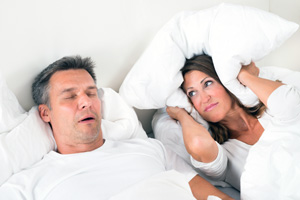Snoring/Sleep Apnea
How serious is a snoring problem?
Millions of Americans snore and although they might not even realize they snore, their partners definitely do. Snoring can rob both bed partners of a good night’s sleep — snoring is also a sign of a potential health risk known as sleep apnea.
What is sleep apnea?
Sleep apnea is a sleeping disorder where a person involuntarily stops breathing while they are asleep. Oftentimes, a person doesn’t know they have sleep apnea because they aren’t fully awakened. More common in men than women, sleep apnea is usually experienced by those who are overweight, smoke or abuse alcohol, and pregnant women. Sleep apnea not only disrupts the affected person’s sleep but can disrupt the sleep of family members due to characteristically loud snoring.

What causes sleep apnea?
The three most common types of sleep apnea are:
- Obstructive sleep apnea is when the airway is blocked, most often by the soft tissue at the back of the mouth. The soft tissue collapses and closes the airway.
- Central sleep apnea, is when the brain fails to signal the muscles to breathe.
- Mixed sleep apnea, is a combination of the two.
With each type of sleep apnea, the brain wakes the sleeper, usually only partially, to signal breathing to resume. Because of this, sleep is very disruptive and of poor quality.
How is sleep apnea treated?
Morgan & Haupt Dentistry treats patients who have obstructive sleep apnea, focusing on the following solutions:
Snore Guard Oral Appliance:
We fit patients with a removable snore guard oral appliance worn during sleep to reposition the jaw and keep the airway open during sleep. The oral appliance is like a sports mouth guard and highly effective for treating sleep apnea and snoring in certain patients. The appliance works by repositioning the lower jaw slightly forward of its normal position. This minor adjustment effectively keeps the airway open.
Weight Loss:
Overweight patients are more prone to sleep apnea. In fact, seventy percent of patients affected by obstructive sleep apnea are overweight or obese. Using an oral appliance in combination with losing weight can impact sleep apnea symptoms.
Positional Therapy:
Positional therapy is where the sleeper changes the position of their sleep. Most people find that sleeping on their back worsens sleep apnea and snoring. Making a simple change to side sleeping may be an effective way to treat sleep apnea, especially in combination with the use of the oral appliance, and weight loss if warranted.
What are the signs I might have sleep apnea?
Because you aren’t fully awakened, you may not know if you have sleep apnea. Some common signs are:
- Loud snoring
- Awakening during the night feeling out of breath or gasping for air
- Persistent daytime sleepiness
- Waking with dry mouth
- Frequent headaches upon wakening
